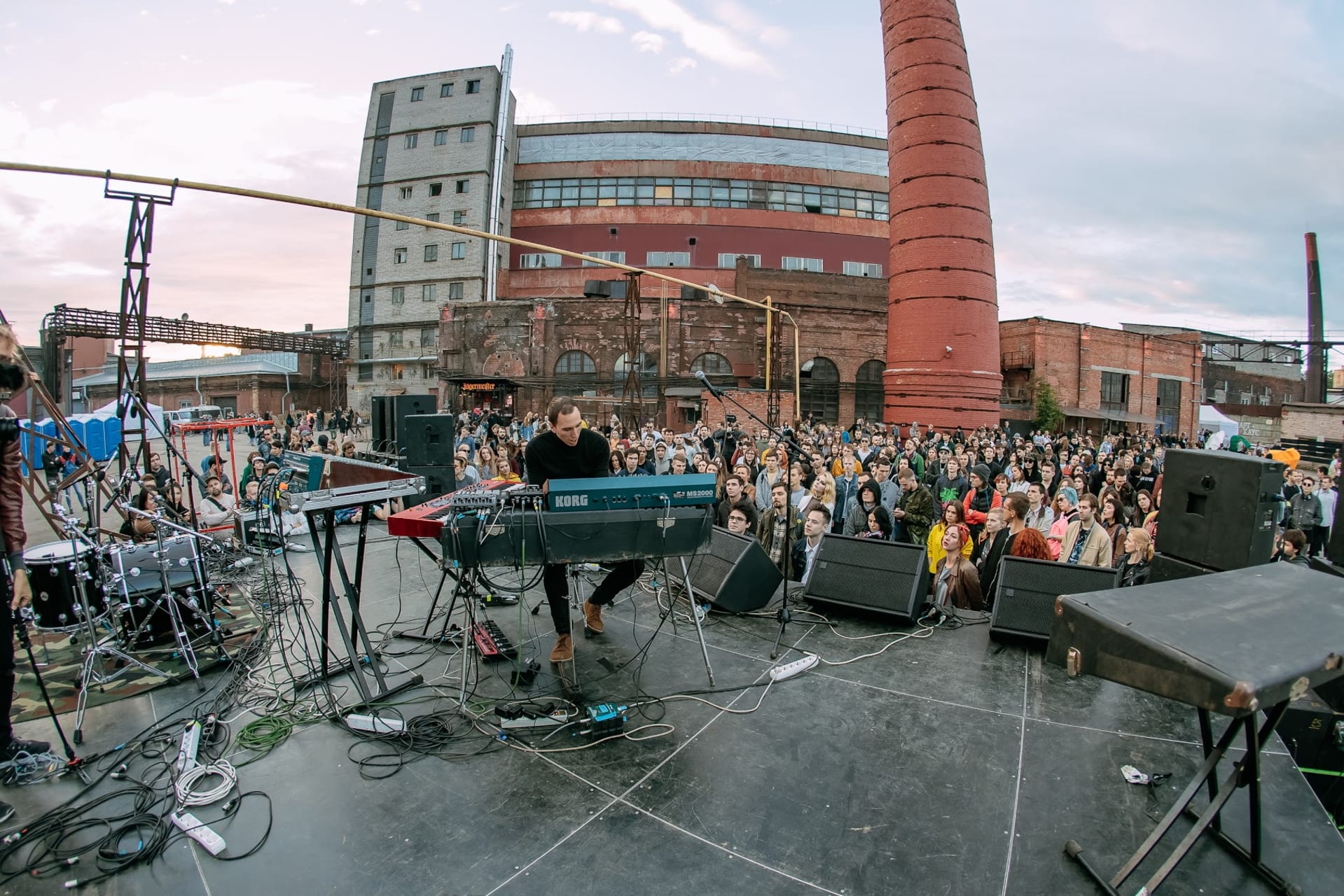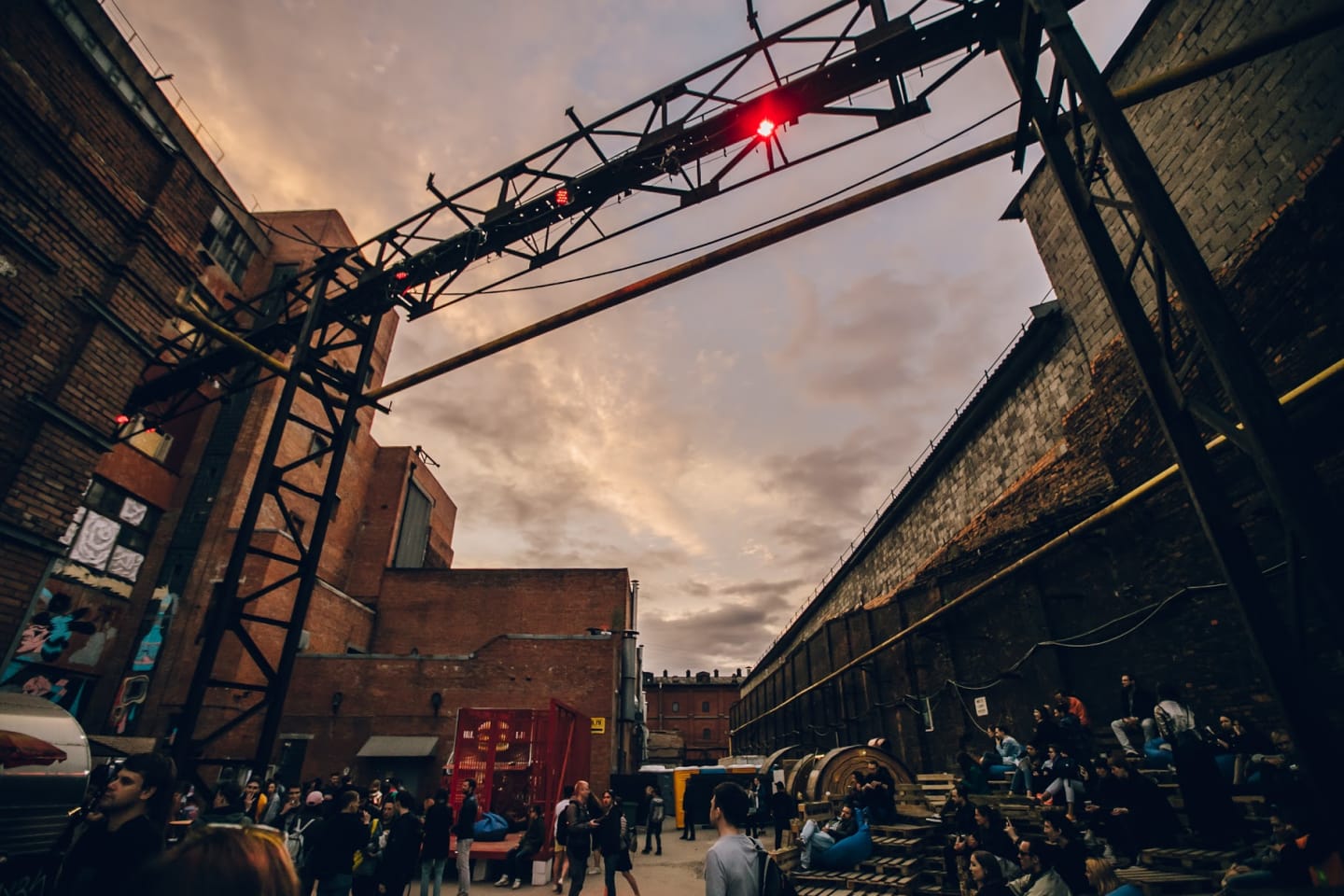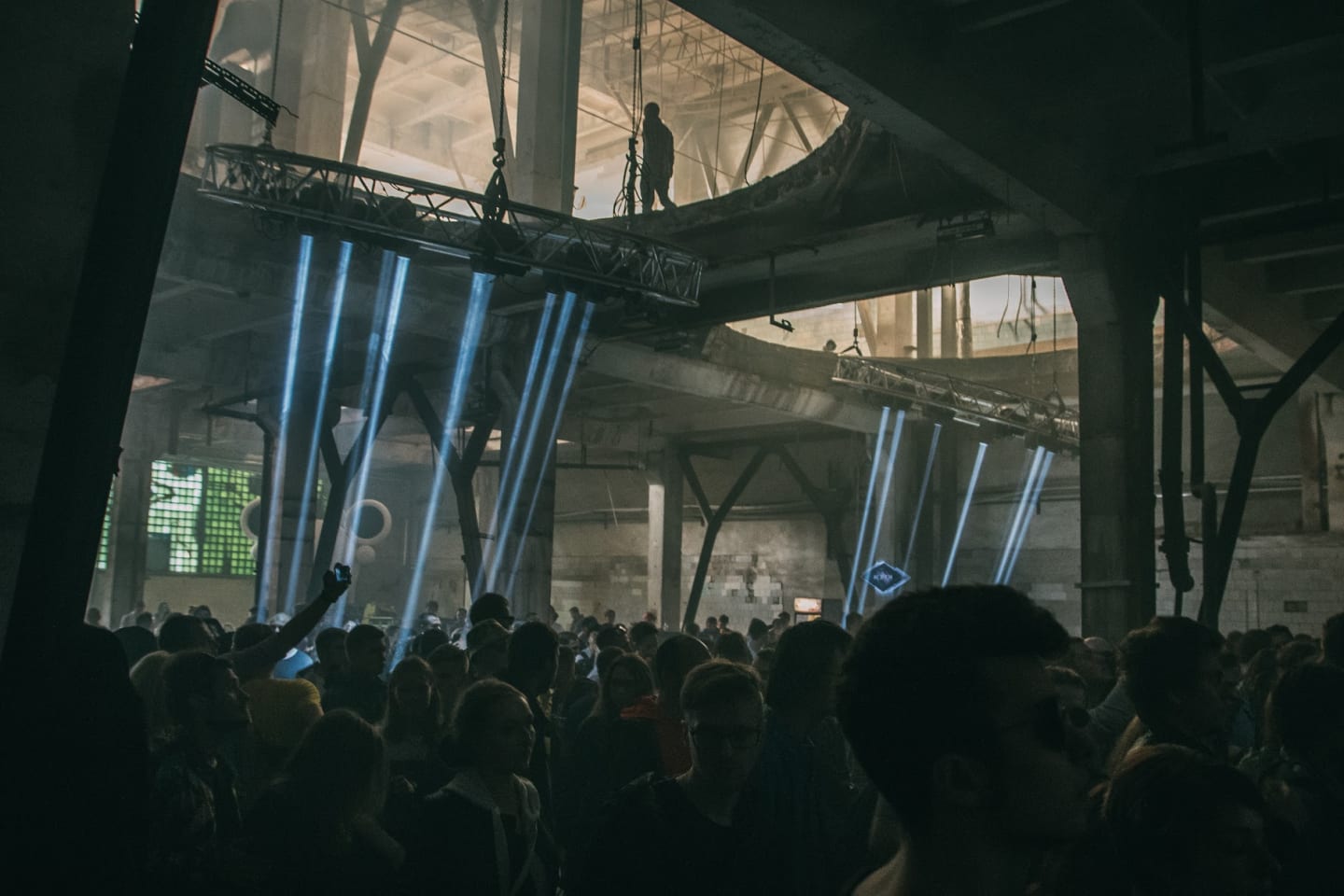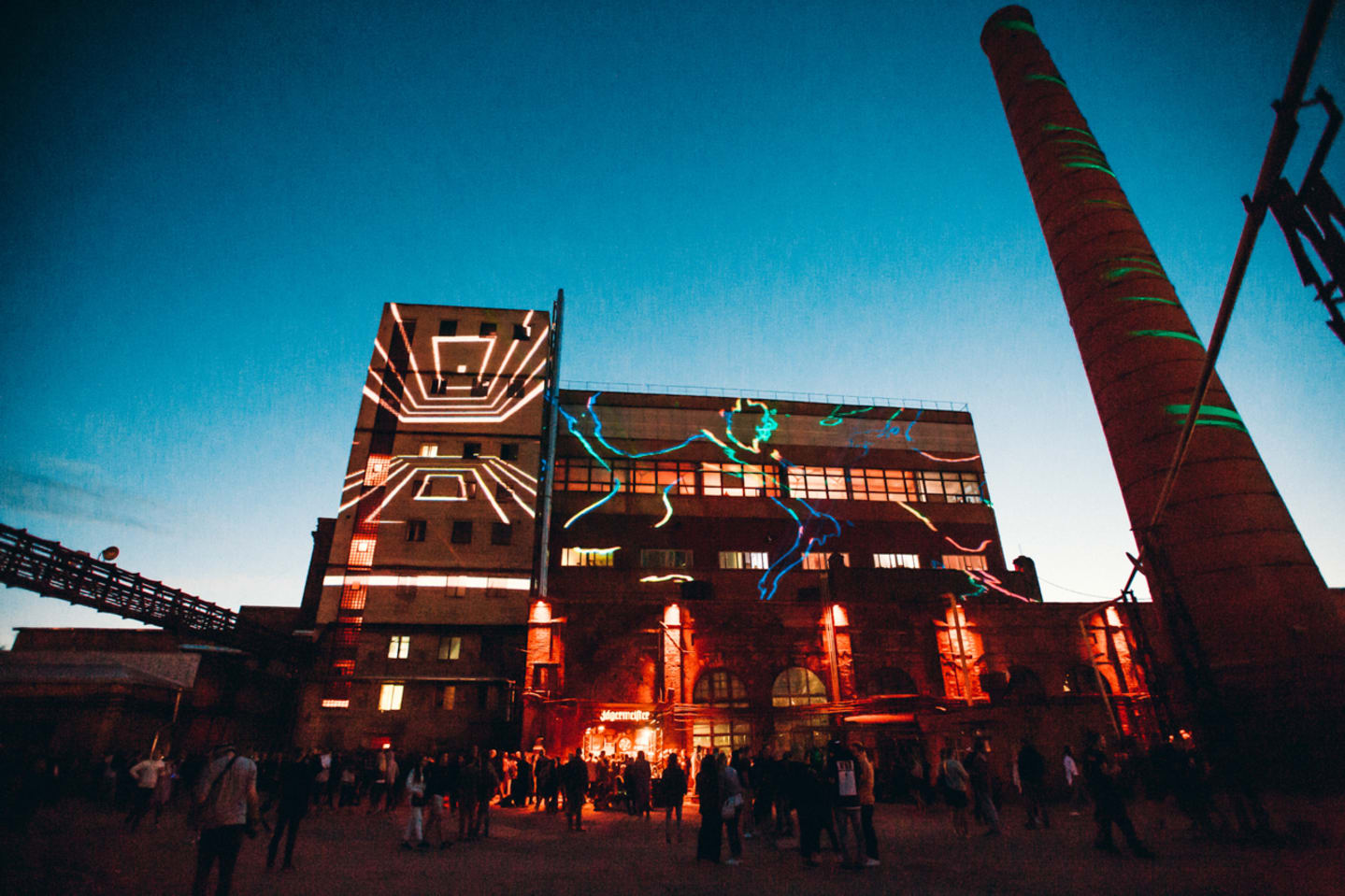
From Siberia To Saint Petersburg: The Story Of Russia’s GAMMA Techno Festival
How a new community has picked up the torch since the closure of Outline Festival's closure in 2016.
Three years after being forced by a noise complaint to move their festival midway through, M_Division and GAMMA Festival are now stronger than ever in a Russia that sometimes lags behind and struggles with fresh and innovative perspectives.
From July 11 through 14, Gamma Festival was held for the fourth time in Saint Petersburg, featuring the likes of Surgeon and Dax J. It also showed multimedia performances and art with a stage dedicated to AI featuring performances powered by artificial intelligence.
In a country generally slow with understanding and assimilating its youth culture, and that sometimes even moves against it—like when it calls for a ban on hip-hop music—the road which has been traveled by the M_Division collective is commendable. From small raves in Siberia, they made their way to Saint Petersburg and grew local techno parties into an international multidisciplinary project. Their aim is to not only bring artists to Russia, but also to share and show what their bubbling and extremely creative scene can bring to the rest of the world.
After the tragic cancellation and closing of Outline Festival by the authorities in 2016, M_Division and a few other collectives have picked up the torch for a community striving for radical experimentation, art and music.

After recovering from a long White Night in Kisloty, the DIY club that popped up for two years in the south of Saint Petersburg, we meet Ivan Logos and Slava Kostyakhin for a cup of herbal tea on a pretty rooftop that dominates the red tiles of the surrounding buildings. As the sun sets and the pink and red starts to eclipse the blue of the gorgeous sky, a procession of couples take turns for a selfie on the rail, with the golden dome of Saint Isaac’s cathedral in the background. Accompanied by his girlfriend, Ivan apologizes for not being that comfortable with English, and he often turns to their press officer Ania when he wants to add something to the conversation that he understands, nevertheless, without any problem.
Slava and Ivan met in Omsk, one of the bigger cities in central Russia neighboring Kazakhstan and Novosibirsk. Back then, Slava studied informatics and economics while Ivan was becoming an engineer. The Internet had already established global connections between people who shared a common interest. So despite being physically remote from many things, they had no trouble discovering new music, and right away Ivan dabbled in production and DJing. They were going out to nights where he would play, but right when they finished university, a financial crisis hit Russia in 2008 and most clubs closed. “It was a really sad thing, we partied a lot and suddenly there was nothing. So if we couldn’t go anywhere, we thought, let’s just do it ourselves,” explains Slava. From this point they threw parties that gathered a few hundred people every two weeks, but the promising beginnings soon died down and they stopped to figure out what they were doing wrong, and decided to come back with a festival.
“Around 2009 in deep Siberia, the festival culture started to grow and we had our first events with quality music there. So it was our ambition to do that. The only problem is that summers in Siberia are not perfect. On the night of our festival it was seven degrees and it rained all night long. 700 people showed up and danced for the whole thing, it was super friendly but we went deep into the red and then we disappeared for one weekend wondering ‘What shall we do next?’”
Because so many businesses had to close, it was really easy to find and rent a warehouse. At that point of the interview, both Ivan and Slava pause and talk to each other in Russian. Kazantip is overheard in the discussion, and then they reveal that they had planned to go to the infamous few-week-long festival in Ukraine. “Back then it was hype and political, they had embassies, and we became the official embassy in Omsk, we just wanted to go there for vacation, you’d get lists,” they say amidst laughter. But the parties they threw under the Kazantip banner were hugely successful and allowed them to pay their debts inherited from their first festival and to prepare new projects. New events were launched in 2010 when they regularly invited over 2000 people to rave in an industrial zone. That was when their first international big bookings occurred. “We invited Ben Klock to Omsk in 2010, it wasn’t too hard because he wasn’t this superstar yet. When I picked him up at the airport, he just stayed silent the whole trip looking outside the window with a face that seemed to say “Where the fuck am I?” Of course after he got to the hotel and we talked at the dinner he was a bit more relaxed, but when he came to the warehouse where the party was, he completely changed. It was 2500 people raving in a crazy underground place. He started to play with a huge smile and when he finished he just said one thing: “Thank you guys, it was like playing Berlin in the ’90s.”

For artists such as Ben or Steve Rachmad who came to Omsk, it probably felt like traveling in a time machine. Techno was so new and fresh in this region that people were craving for these types of events, dancing the whole night like there was no tomorrow. But for Slava it was time for a change and he moved to Moscow. Ivan, on the other hand, stayed a bit longer before settling in Saint Petersburg around 2013.
Contrary to Siberia, both cities already had a rich history with electronic music, and when they discovered Saint Petersburg it was a completely new universe. “When you arrive you realize how many opportunities there are, how you just need to do something. We decided to keep doing what we used to do, throw parties in industrial zones, warehouses and things like that. For this city it was unusual. We brought Octave One and Blade Baxter for an event a bit outside of the city center and people were surprised.”
It was on the Russian social network Vkontakte (VK) that they put the word out. Russia does not really have magazines, radio shows or media about electronic music that have much of a reach, except Mixmag, which started there a couple of years ago. Their first party went well because people decided to come check out the kids arriving from central Russia. But their second party completely tanked with only half the people showing up. Deep into the red, they found themselves having to reconsider their plans for their third night with an Ostgut showcase that ended up being cancelled: “We didn’t have sponsors, and we thought if we opened the doors and lost money again, we’d completely die. We were so broke after these two parties that we already had to do other jobs and focus on repaying everything. We couldn’t take that chance. It should have been an Ostgut Night but we had to cancel. It was a small scandal and I had to meet them in Berlin to sort things out,” recalls Slava.

After a year and a half, the club море offered to collaborate with them. From this point on, they threw smaller parties in that venue which could host 500 people. After it closed, they moved to a new space which was abandoned and that they reworked and transformed. Three buildings that were empty were turned into a maze of small and bigger dance floors. “That was pretty cool and new, I think that is when we caught an audience in Saint Petersburg and people started to trust us and follow us,” they add. This was in 2015, and they began to be more and more interested in experimental music and other media, notably booking people from Raster Noton. Back then it wasn’t that popular yet, but experimental sounds are huge in Russia nowadays. With the success from their previous parties, M_Division started to get sponsorships from different brands. Finally with this new strength acquired, it was time to do big things and this is how they crawled back the festival idea.
“We didn’t want to produce another music festival, we wanted something new, like a creative platform that would unite artists, musicians, creative people of our city.”
For months they brainstormed about what they would call the festival before one morning Slava got a call from Ivan where he screamed: “GAMMA.” Meanwhile, they drove around the city with a friend who used to work in a real estate. That was when they found an abandoned shipyard not far from the city center. Nobody had used it for 25 years and it had been seized by banks because of the debts of its previous owner. After a series of meetings they got a lease for three months. Cleaning up an abandoned shipyard is no easy task and they made an open call for help which drew dozens of people only motivated by the idea of a new festival in their city.
That is a story quite common in Russia where places like Kisloty were also cleaned up with the help of volunteers. The scene is fragile but the community is strong with people helping each other because for them these events are precious. As Ivan puts it, “If you do this in Russia, it’s not about business, but about life I think.”

And the state was usually not there to help either. At the beginning, Gamma did not get any help from the city or any institutional body. As is common with most Russians we interviewed, when you mention the government, there is an instant visible reaction. Muscles get tense, people straighten up and if there is any criticism it is usually under the cover of irony. “In every country you have laws. In some places in Europe you can’t party after 6am. Here we can and we have no time limit. The police should do their job and if they come they can do their thing. They don’t want to close everything. I think the system would just like you to live inside the system” explains Slava.
So if you follow the rules you are usually fine. For the first iteration, they decided to make a huge line up and invite visual and street artists. The event was very successful, but on the second day they got told that some people on the other side of the water complained about the noise. Agents came to close it down shortly after. Stuck inside the shipyard, they packed up everything in three hours and moved to a nightclub with a rooftop where all the artists that were scheduled played. #savegamma went viral in the community and a lot of people came for the second night just to support M_Division. At the end it wasn’t perfect but the feedback they got was that it had “a soul.”
In 2017 they finally settled on a new location, Stepan Razin factory, which was the first brewery in the Russian Empire founded in 1795. Today, part of the brewery is not functioning and has the status of a monument of industrial architecture. That move also marked the moment it became a true multidisciplinary festival with a contemporary art platform alongside the music part. Again, they offered young artists to send applications and granted money for 56 works that were exhibited inside the festival ranging from videos to huge murals and so on: “We wanted to go wider, to have a complete project, not only an underground music festival. It’s an open-minded thing, it’s important for the country and the city I think. We want to have a city festival, a cultural festival. That is also why we launched Gamma Pro,” adds Slava.
Gamma_PRO Pro started in 2018 as a series of conferences on art and technology which take place during Gamma. This signalled a new direction under the leadership of curator Natalia Fuchs (ARTYPICAL) who was brought in to coproduce the professional program of the festival. A whole educational program was envisioned. They offered free lectures for three days in two different cities wherein attendees could then apply to an intensive course with teachers about sound and visual arts. The works or performances were then presented at an event called Mediaspunk, and some were then implemented into the Gamma Festival. These new directions allowed them to connect to older institutions such as Lenfilm, the historical movie studio that used to be a unit of the cinema of the Soviet Union.
Lenfilm shared their archives with M_Division which were used by artists to produce video artworks for the festival, some were then added to the official museum collection of Lenfilm: “They want our help to connect with the younger generation. The city government also realized there was something new so they contacted us to see if we could maybe find a way to have a positive influence on them and the city. Our mission is to explain that this underground music is contemporary art already. We are the youth and should teach them that not only pop music matters. These old institutions are so Sovietic. They need fresh ways. After this collaboration, they realize we can be useful together. These are the results if you ask what is Gamma. This is a great result for everyone, not only for us.” Gamma really managed to reach out and show that what they are doing within electronic music and arts is something culturally interesting and valuable. The most noticeable change is that they are now partially funded by institutional bodies and collaborating with some universities, the Saint Petersburg Cultural Forum, and the Ministry of Culture of the Russian Federation. As their curator Natlia Fuchs puts it: “we are into cultural diplomacy.” Meanwhile the international circuit has realized there is something going on, Raster Noton held their last campfire there and Mutek is already a partner.
The 2019 edition began with a performance of Kazuya Nagaya paired to video artist Ali M.Demirel inside the full dome of the planetarium. Techno was again honored with the likes of Varg and Oscar Mulero on the bill. But there were also more leftfield sounds from Soho Rezanejad and a whole immersive multimedia artistic experience that ranged from an artificial intelligence-assisted harpsichord concert to unconventional paintings. For M_Division and the ever-evolving GAMMA, it’s not about business, but life, and the journey from Siberia to today hasn’t been without its bumps, but it also shows the resilience and passion that impel this community and its different collectives operating in the federation.
Published July 31, 2019. Words by Christophe Vu-Augier de Montgremier.
